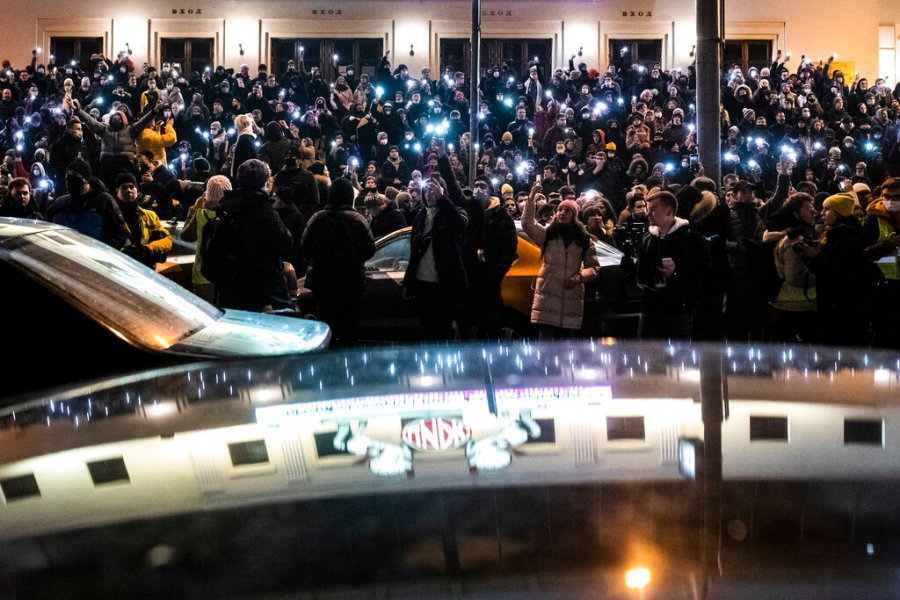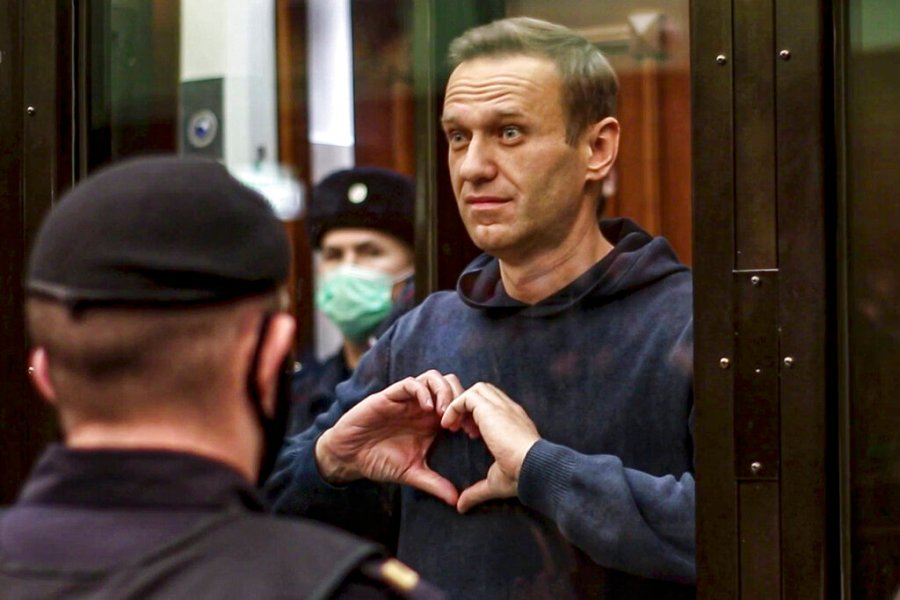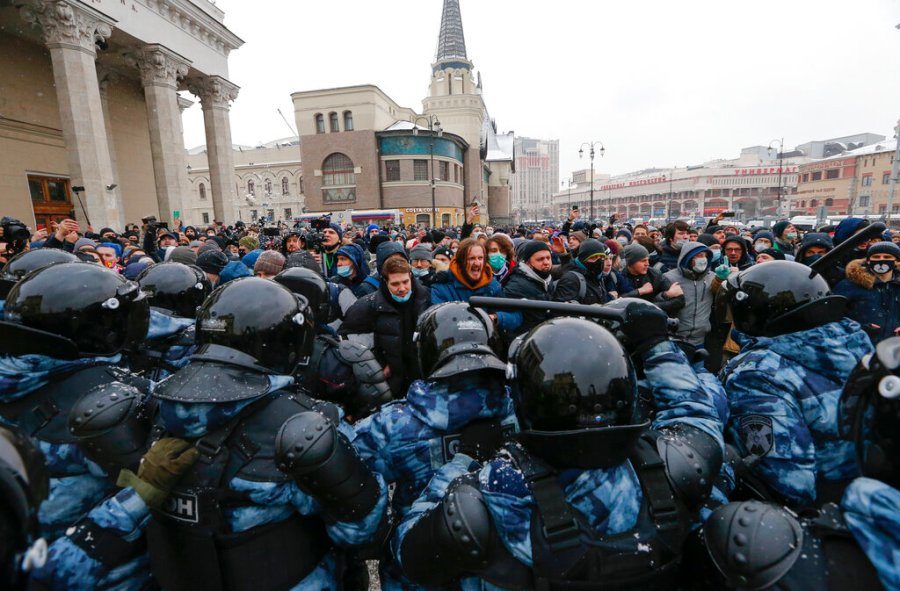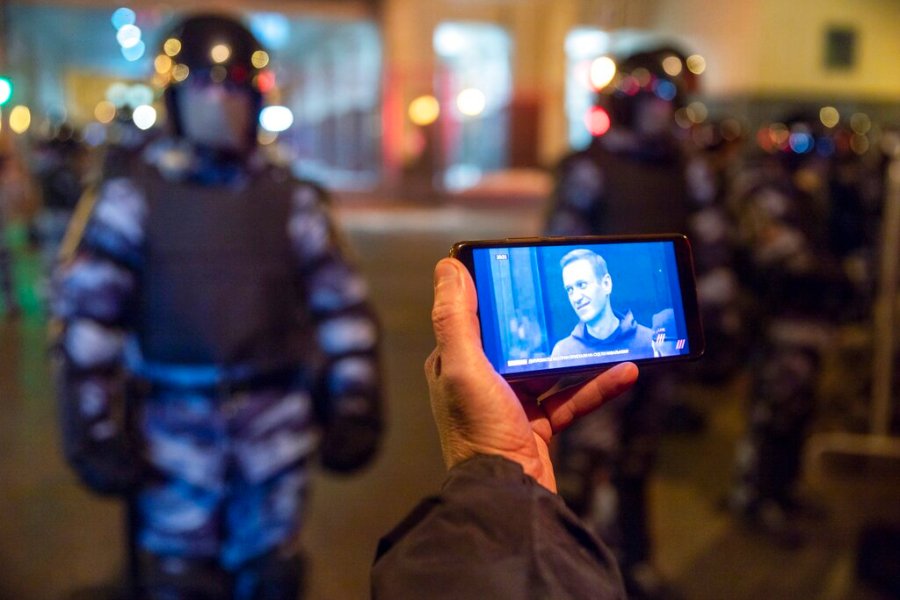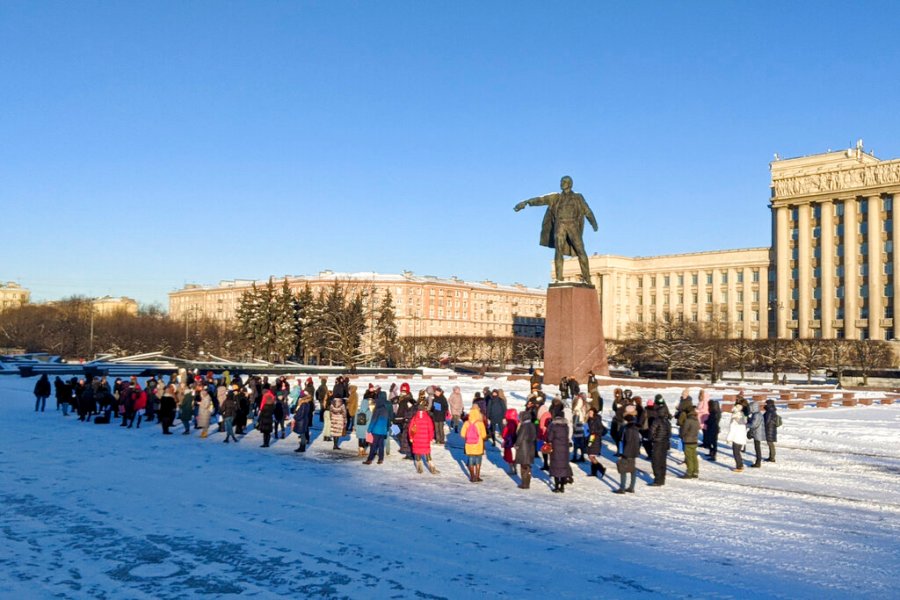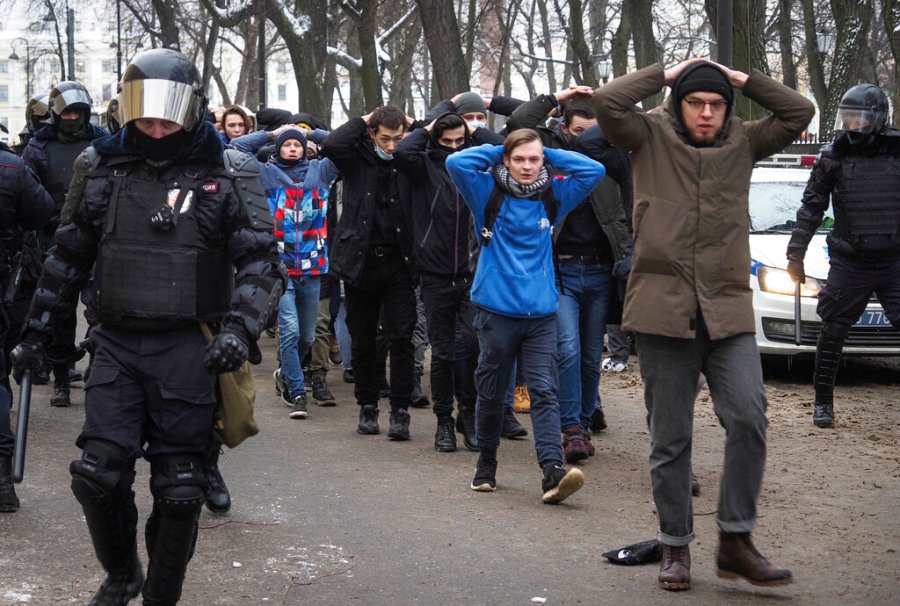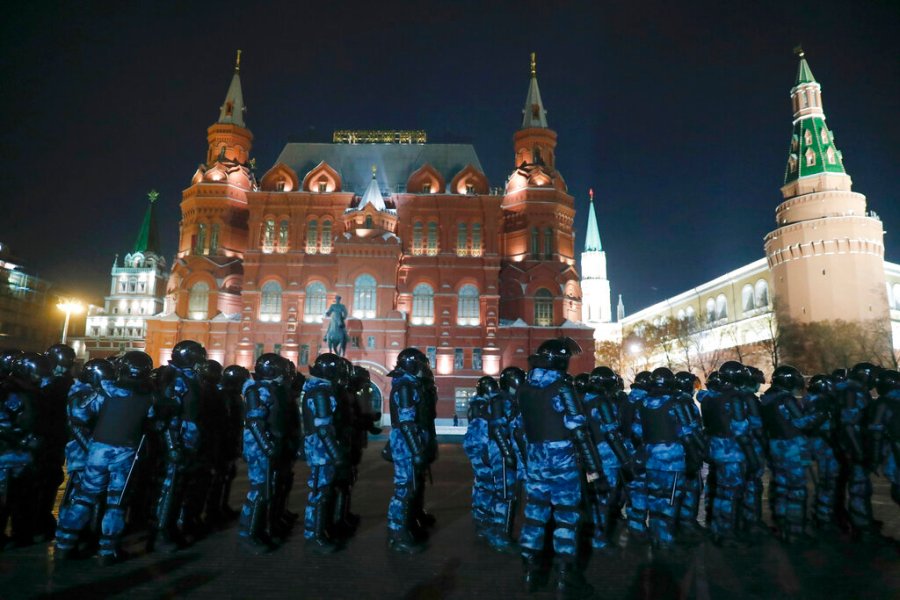Russia moves to extinguish pro-Navalny ‘flashlight’ protests

A demonstrator shines his cellphone flashlight as an other waves a poster reads “I’m not afraid, Freedom for Navalny” during a protest against the jailing of opposition leader Alexei Navalny in Moscow, Russia, Saturday, Jan. 23, 2021. When the team of jailed Russia opposition leader Alexei Navalny announced a protest in a new format, urging people to come out to their residential courtyards on Sunday and shine their cellphone flashlights, many responded with jokes and skepticism. (Evgeny Feldman/Meduza via AP)
Testing on staging11
MOSCOW (AP) — When the team of imprisoned Russian opposition leader Alexei Navalny urged people to come out to their residential courtyards and shine their cellphone flashlights in a display of unity, many responded with jokes and skepticism. After two weekends of nationwide demonstrations, the new protest format looked to some like a retreat.
But not to Russian authorities, who moved vigorously to extinguish the illuminated protests planned for Sunday.
Officials accused Navalny’s allies of acting on NATO’s instructions. Kremlin-backed TV channels warned that flashlight rallies were part of major uprisings around the world. State news agencies cited unnamed sources saying a terrorist group was plotting attacks during unapproved mass protests.
The suppression attempts represent a change of tactics for the authorities who once tried to weaken Navalny’s influence by erasing him.
Kremlin-controlled TV channels used to largely ignore protests called by Navalny. Russian President Vladimir Putin has never mentioned his most prominent critic by name. State news agencies referred to the politician and anti-corruption investigator as “a blogger” in the rare stories they ran mentioning him.
“Navalny went from a person whose name is not allowed to be mentioned to the main subject of discussion” on state TV, Maria Pevchikh, head of investigations at Navalny’s Foundations for Fighting Corruption, said in a YouTube video Friday.
Pevchikh credited Navalny’s latest expose for the sudden surge in attention. His foundation’s two-hour-long video alleging that a lavish palace on Black Sea was built for Putin through elaborate corruption has been watched over 111 million times on YouTube since it was posted on Jan. 19.
The video went up two days after Navalny was arrested upon returning to Russia from Germany, where he spent five months recovering from nerve-agent poisoning that he blames on the Kremlin. The Russian government denies involvement and has said it has no evidence that Navalny was poisoned.
Navalny later was ordered to serve 2 1/2 years in prison on the grounds that his time in Germany violated a suspended sentence he was handed in a money-laundering and fraud conviction.
While the high-profile arrest and the subsequent expose were a double blow to authorities, political analyst and former Kremlin speech writer Abbas Gallyamov says that keeping Navalny and his activity off the airwaves to deprive him of additional publicity no longer makes sense.
“The fact that this strategy has changed suggests that the pro-government television audience is somehow receiving information about Navalny’s activities through other channels, recognizes him, is interested in his work, and in this sense, keeping the silence doesn’t make any sense,” Gallyamov said.
The weekend protests in scores of cities last month over Navalny’s detention represented the largest outpouring of popular discontent in years and appeared to have rattled the Kremlin.
Police reportedly arrested about 10,000 people, and many demonstrators were beaten, while state media sought to downplay the scale of the protests.
TV channels aired footage of empty squares in cities where protests were announced and claimed that few people showed up. Some reports portrayed police as polite and restrained, claiming officers had helped people with disabilities cross busy streets, handed out face masks to demonstrators and offered them hot tea.
Once the protests died down and Navalny ally Leonid Volkov announced a pause until the spring, Kremlin-backed media reported that grassroots flash mobs titled “Putin is our president” started sweeping the country. State news channel Rossiya 24 broadcast videos from different cities of people dancing to patriotic songs and waving Russian flags, describing them as a genuine expression of support for Putin.
Several independent online outlets reported that instructions to record videos in support of Putin came from the Kremlin and the governing United Russia party, and that people featured in some of the recordings were invited to shoots under false pretenses.
The Russian president’s spokesman, Dmitry Peskov, said the Kremlin had nothing to do with the pro-Putin videos.
After Navalny’s team posted its video involving the palace allegedly built for Putin, state channel Rossiya aired its own expose of Navalny. Anchor Dmitry Kiselev said that while working on the investigation in Germany, Navalny lived “in the luxury he so much despises.”
The reporter sent to chronicle the allegedly luxurious lifestyle the politician maintained while abroad filmed inside a house Navalny rented but failed to capture any high-end items in the two-story building, which featured several bedrooms and a small swimming pool.
She pointed to “two sofas, a TV, fresh fruit on the table” in the living room and “a kitchen with a coffee machine,” and described a bedroom as “luxurious” even though it didn’t look much different from a room in a business hotel.
In recent days, official media coverage has focused on plans for this weekend’s flashlights-in-courtyards protest. Reports extensively quoted Navalny ally Volkov’s social media post announcing the event and accused him of acting on instructions from his Western handlers, pointing to an online conference with European officials he took part in the day before.
The political talk show “60 Minutes” devoted nearly a half-hour to the topic, calling the flashlight rally an idea from a handbook on revolutions. It aired footage of protesters shining flashlights during the 2014 Maidan protests in Ukraine, mass rallies in Belarus last summer and other uprisings around the world.
On Thursday, state news agencies Tass and RIA Novosti reported, citing anonymous sources, that a terrorist group from Syria was training insurgents for possible terrorist attacks in Russian cities “at locations of mass rallies.”
The reports didn’t refer to any specific protests. Neither did public warnings against “unauthorized public events” the Prosecutor General’s office and Russia’s Interior Ministry issued Thursday, although the ministry mentioned events “planned for the nearest time.”
“The Kremlin is awfully scared of the flashlight action,” because such a peaceful, light-hearted event would allow the opposition to build a rapport with new supporters who are not ready to be more visible and involved in the protests, Volkov said in a YouTube video.
He suggested that the heavy-handed response to the announcement actually helped dispel skepticism about the courtyard demonstrations.
“I saw many posts on social media (saying) ‘When Navalny’s headquarters announced the flashlight rally, I thought what nonsense… But when I saw the Kremlin’s reaction, I realized they were right to come up with it.’”
Trademark and Copyright 2021 The Associated Press. All rights reserved.

